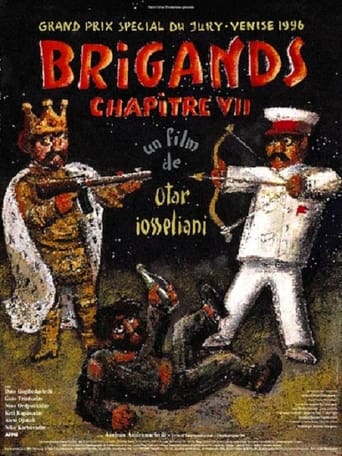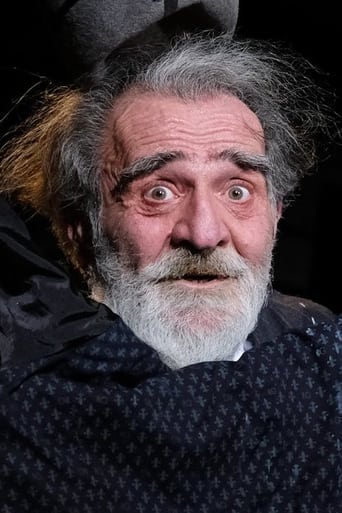Brigands, Chapter VII (1996)
A witty, despairing French-Russian-Italian-Swiss art movie set in 16th-century Georgia, Stalinist Georgia, contemporary Georgia, and contemporary Paris, featuring the same set of actors in all four settings.
Watch Trailer
Free Trial Channels
Cast


Reviews
Please don't spend money on this.
Instead, you get a movie that's enjoyable enough, but leaves you feeling like it could have been much, much more.
It’s fine. It's literally the definition of a fine movie. You’ve seen it before, you know every beat and outcome before the characters even do. Only question is how much escapism you’re looking for.
The movie is wonderful and true, an act of love in all its contradictions and complexity
I am giving Brigands the highest mark. However, I believe it is virtually impossible to appreciate the movie without sufficient knowledge of Soviet history and perhaps some involvement into Perestroika and post Perestroika cultural context.The film is an antithesis to very famous movie by Tengiz Abuladze (also a Georgian as Iosseliani) Monanieba (Confession). The later was one of the first attempts to rethink and reevaluate the past involvements of all layers of society in Stalin terror. It was of special significance that a Georgian has made such a film because Stalin even until now possesses a status of icon in his home country. Confession took a stance that all that had happened was a great tragedy and everybody was guilty to have let it happened.Brigands, on the other hand, portraits the Stalin terror as something very mundane and boring, pushing a viewer to only one logical conclusion that it was unavoidable having in mind that authorities in all times had been no more than ordinary brigands, gangsters and robbers. Iosseliani uses the same cast to play historically parallel roles from medieval Georgia to the very recent events of collapse or the Soviet Union. The same actors and repeating at least in spirit parallel events create some static recognizable core in seemingly distant and different stories.The film appeals to various known historical facts such as personal Stalin involvement in criminal acts of bank robberies before Bolsheviks had noticed him.It is a masterpiece in both cinematographic and philosophic way.
This picture interlinks three stories on three different time levels. It starts in the present; today's Georgia is shaken by riots. Three friends are muddling through. Soon we concentrate on one of them. He plays a leading role every time. First as a medieval prince, than as a local officer of the Communist NKWD under Stalin. Those three levels are constantly referred to; they add to each other in a flow. Iosseliani has the same cast acting on all those levels. Every new entrance of the same actors in each episode underlines the continuity of occurrences in the flow of time. Despotism and terror rule at any time, injustice and bloodshed return eternally. It is for Iosseliani's craftsmanship that, along with all that bitter realization, there comes fun.
i suppose the trick while watching Ioseliani's movies is to take them just as they are. trying to conceptualize them as less as possible. movie figure out the ideas himself while head is tranquil and mind is open. the colors, the visual series seems to be rather not less important then the plot gimmicks and characters. and all together it's a very special flow if perception. personally i enjoyed it a lot. i really liked his way of seeing.
if i hadn't seen his Otar Iosseliani's next film, 1999's masterpiece "Adieu, Plancher des vaches !". So my comment will probably be linked to the two films rather than only to this particularly strange journey, adrift in a Parisian's tramp mind. War is the main thread that links his dreams, as he embodies a medieval king, or a communist leader, or remembers of his east-european country, ravaged by war. But more interesting is the permanent obsession, for Iosseliani, of typical features like Cinema in itself, Paris, where the director actually lives (he's from Georgia), tramps, alcohol and songs. The scenes which I think are 'real' in opposition to 'dreamt' ones, mainly show the hero, with his unfortunate friends, but still happy singing beautiful harmonies. Just like the last scene (and others) from "Adieu,..". It is a bit difficult to follow the plot, since there are so many different ages edited together, but as the very first sequence shows us, this is only Cinema. So just let your mind wander with the pictures.






